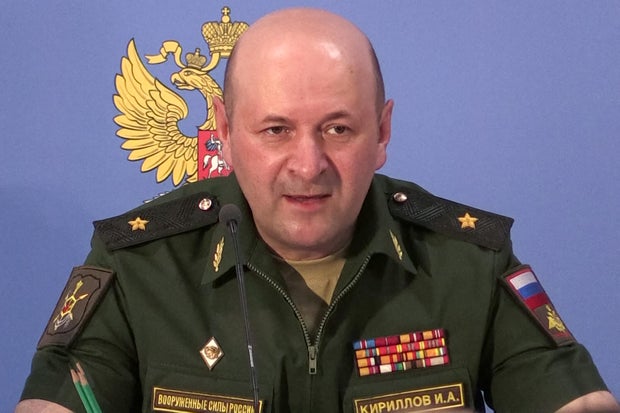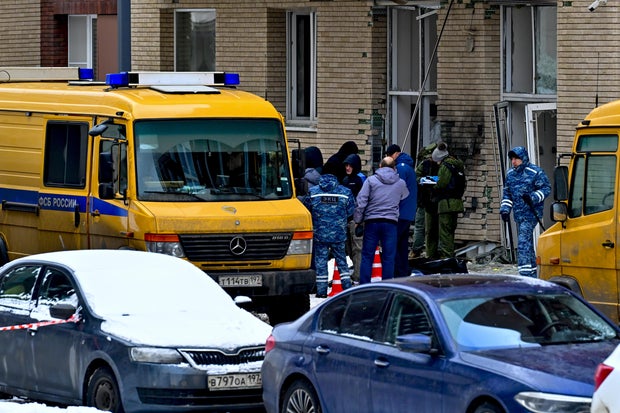CBS News
Suspect detained in killing of Gen. Igor Kirillov, head of Russia’s biological, chemical forces in Moscow blast

Moscow — Russia’s security service said Wednesday that it has detained a suspect in the killing of a senior general in Moscow.
The suspect was described as an Uzbek citizen recruited by Ukrainian intelligence services.
Russia’s Federal Security Service, or FSB, didn’t name the suspect, but said he was born in 1995. According to an FSB statement, the suspect said he was recruited by Ukrainian special services.
Ukrainian security sources had told CBS News Monday that the Security Service of Ukraine (SBU) killed Kirillov in a special operation. The claim couldn’t be independently verified, but Russian officials quickly vowed to take revenge against Ukraine’s leaders.
AFPTV / AFP via Getty Images
Lt. Gen. Igor Kirillov was killed Tuesday by a bomb hidden in a scooter outside his apartment building in Moscow, a day after Ukraine’s security service leveled criminal charges against him. His assistant also died in the attack. A Ukrainian official said the service carried out the attack.
The FSB said the suspect had been promised a reward of $100,000 and permission to move to a European Union country in exchange for killing Kirillov.
The agency stated that, acting on instructions from Ukraine, the suspect traveled to Moscow, where he picked up a homemade explosive device. He then placed the device on an electric scooter and parked it at the entrance to the residential building where Kirillov lived.
The suspect then rented a car to monitor the location and set up a camera that livestreamed footage from the scene to his handlers in the central Ukrainian city of Dnipro. Once Kirillov was seen leaving the building, the suspect detonated the bomb.
According to the FSB’s statement, the suspect faces “a sentence of up to life imprisonment.”
Kirillov, 54, was the chief of the military’s nuclear, biological and chemical protection forces and was under sanctions from several countries, including the U.K. and Canada, for his actions in Moscow’s military operation in Ukraine. On Monday, Ukraine’s Security Service, or SBU, opened a criminal investigation against him, accusing him of directing the use of banned chemical weapons.
Russia has denied using any chemical weapons in Ukraine and, in turn, has accused Kyiv of using toxic agents in combat.
Kirillov, who took his current job in 2017, was one of the most high-profile figures to level those accusations. He held numerous briefings to accuse the Ukrainian military of using toxic agents and planning to launch attacks with radioactive substances – claims that Ukraine and its Western allies rejected as propaganda.
The bomb used in Tuesday’s attack was triggered remotely, according to Russian news reports. Images from the scene showed shattered windows and scorched brickwork.
Sefa Karacan / Anadolu via Getty Images
Russia’s top state investigative agency said it’s looking into Kirillov’s death as a case of terrorism, and officials in Moscow vowed to punish Ukraine.
CBS News
Page Not Found: 404 Not Found
The page cannot be found
The page may have been removed, had its name changed, or is just temporarily unavailable.
Be the first to know
Get browser notifications for breaking news, live events, and exclusive reporting.
CBS News
Details on bill to avert government shutdown

Watch CBS News
Be the first to know
Get browser notifications for breaking news, live events, and exclusive reporting.
CBS News
Explosion kills 2 Mexican soldiers in suspected booby trap by drug cartel after troops found dismembered bodies

An improvised land mine apparently planted by a drug cartel killed two Mexican soldiers and wounded five others, Mexico’s defense secretary said Tuesday. Before the blast, the soldiers had discovered the dismembered bodies of three people, officials said.
Gen. Ricardo Trevilla acknowledged that the army had already suffered six deaths from such improvised explosive devices, or IEDs, between 2018 and 2024. But he didn’t specify whether those six had been killed by bombs dropped from drones, or by buried roadside bombs, both of which have been used by gangs in Mexico.
Trevilla said that devices like the one that exploded Monday were “very rustic,” and officials in the past have described them as similar to buried pipe bombs. There was no immediate information on the condition of the five wounded in the attack, which included at least one officer.
Trevilla’s description of the location where the two soldiers died Monday in the western state of Michoacan suggested that it may have been a sort of grisly drug cartel booby trap.
Trevilla said the army sent out a patrol to check on reports that there was an encampment of armed men in a rural area. The armed forces detected an area protected by stockades that appeared to be an encampment, but when soldiers approached in vehicles, they found the trail blocked by logs, so they descended and had to approach on foot.
While approaching, they spotted three dismembered bodies near the encampment, which appeared to be abandoned. But as they drew closer, a buried device exploded and struck the soldiers.
Trevilla blamed the blast on the United Cartels, an umbrella group that includes the local Viagras gang, which has been fighting bloody turf battles against the Jalisco cartel in Michoacan for years.
In August, the Mexican army acknowledged that some of its soldiers have been killed by bomb-dropping drones operated by drug cartels.
Previously, officials have said the army encounters far more roadside bombs than drone-dropped ones.
The Jalisco drug cartel has been fighting local gangs for control of Michoacan for years, and the situation has become so militarized that the warring cartels use roadside bombs or IEDs, trenches, pillbox fortifications, homemade armored vehicles and sniper rifles.
Nemesio Oseguera-Cervantes, also known as “El Mencho,” the leader of the Jalisco cartel, which the officials described as “one of the world’s most violent and prolific drug trafficking organizations.” The United States and the State Department has offered a $10 million reward for his capture.
In the only previous detailed report on cartel bomb attacks in August 2023, the defense department said at that time that a total of 42 soldiers, police and suspects were wounded by IEDs in the first seven and a half months of 2023, up from 16 in all of 2022.
Overall, 556 improvised explosive devices of all types – roadside, drone-carried and car bombs – were found in 2023, the army said in a news release last year.








